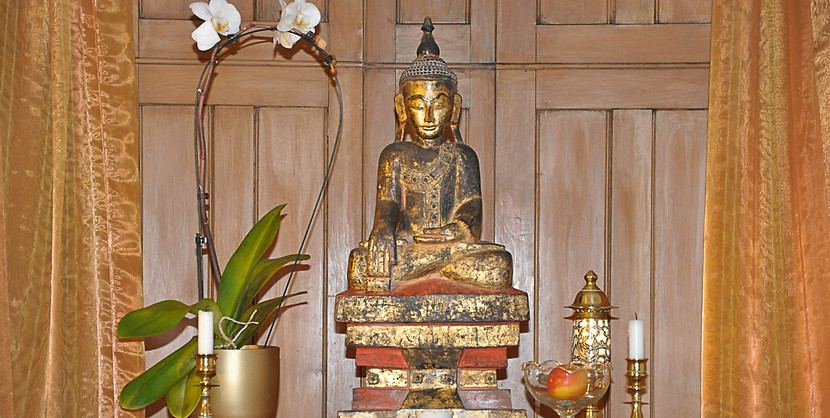
Soto Zen Buddhism
The Buddha Shakyamuni lived 2,500 years ago in India. He was a human being who possessed the same spiritual potential that is within us all. He realised enlightenment and spent His life helping others find what He had found. Enlightenment is the direct realisation of one’s true nature and the nature of all existence – it is the end of suffering and the awakening of compassion. Buddhism does not claim to be an exclusive path to this truth, but it is a way that has led many to the deepest fulfilment.
Each of us already has the same enlightened nature as the Buddha but we obscure it by believing that we are separate, isolated beings. This makes us very needy and we spend our lives trying to get what we think we lack. We may do this through acquiring possessions, power or relationships. It is as though we are trying to fill a void inside but, however much we get, the void always seems to remain.
From the Buddhist viewpoint this happens because we misunderstand our own nature. An important part of Buddhist practice is exploring why it is that we think something is missing in the first place. We gradually come to see that we are already Buddha, and have all that we need to know peace and contentment. However we can only fully know this contentment when we are able to see clearly, and let go of, all the clinging and craving that comes from the belief that we are lacking something.
Since the time of the Buddha many schools of Buddhism have developed. The aim of each has been to express the essence of the Buddha’s teaching in a manner appropriate to the time and culture. The form of Mahayana Buddhism that is known as Zen emerged as a distinct school in China in about the 8th century. Our school of Soto Zen was introduced to Japan in the 13th century by Great Master Dogen.

Statue of Great Master Dogen
Eiheiji Monastery, Japan
The Soto Zen School of Buddhism embodies:-
• The practice of meditation
• Keeping the Precepts
• The teaching that all beings have Buddha Nature
• Awakening the heart of compassion
Meditation
"Zen" literally means meditation, and zazen or "just sitting" meditation is the heart of our practice. In zazen we sit still as embodied beings, in a meditation posture that is both alert and relaxed in body and mind. We allow ourselves to be aware of thoughts, feelings and physical sensations as they arise and pass away, but without either adding to them or trying to suppress them.
Through practising zazen we come to see beyond our thoughts and feelings, and are no longer so driven by anger, fear and desire. We see through our mistaken perceptions and learn to accept ourselves as we are, and to accept the world as it is. If we believe that we are separate from everyone else, then we tend to act selfishly to get what we want. When we know the interconnectedness that is the true nature of things, then we realise that we already have all that we need.
This is a process of discovering what we already have within ourselves rather than seeking outside for what we think we lack. This approach is challenging, as we must explore wholeheartedly the reality of the present moment, with the willingness to see ourselves as we are, without judgement. However, profound transformation becomes possible once we know things as they are.


The Precepts
The Precepts are a description of enlightened action, of how compassion and wisdom manifest through our thoughts, speech and behaviour. The Precepts are not something imposed on us from outside – living by the Precepts arises from our own true wish to express meditation in our everyday life.
-
We take refuge in the Buddha (the source of the teaching), the Dharma (the Buddha’s teaching) and the Sangha (those who practise the teaching).
-
We commit ourselves to refrain from doing what causes harm, instead doing what is good to do and doing good for all beings.
-
To help us live in this way, we undertake to refrain from killing, stealing, coveting, saying what is not true, indulging in intoxicants, speaking against others, being proud of ourselves while devaluing others, being mean, indulging anger and denying the Buddha Nature of ourselves and others.
Through the practice of meditation we come to accept and understand our tendencies to act selfishly and cause harm, and we come to understand the importance of not acting on these tendencies. We see how going against the Precepts causes suffering, both for ourselves and for others.
Buddha Nature
All beings are fundamentally pure, but out of ignorance we create suffering, thereby obscuring our real nature. We can all learn to meditate because we all have Buddha Nature, indeed we all are Buddha Nature, even though we may not yet fully know this. Gradually we come to see that all beings are Buddhas, which means that everyone should be respected, however they choose to live their life.
Compassion and Wisdom
Compassion is aroused when we experience our unity with all life. When we realise this non-duality of existence, the desire to help all beings arises naturally and it is this expression of the compassionate heart that is true wisdom. Compassion and wisdom are our true nature, the nature of Buddha, and we come to know this ever more clearly as we deepen our meditation, and do our best to live according to the Precepts.

